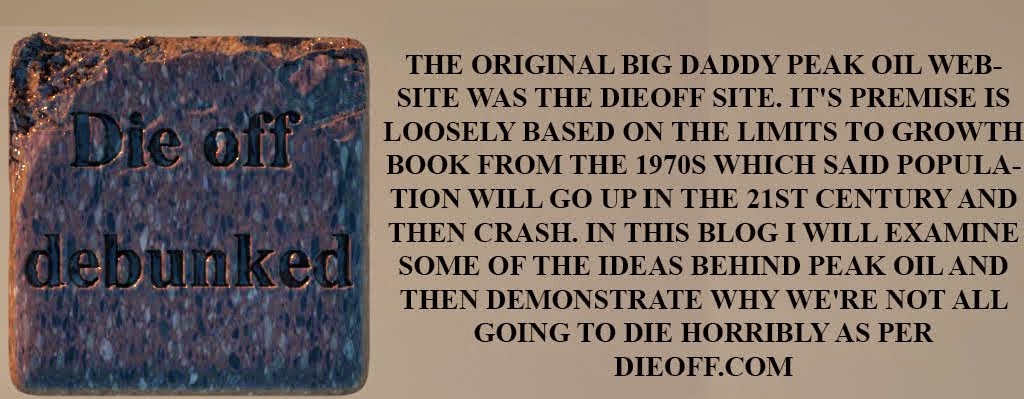One of the most quoted myths among doomers is that it's impossible to cut back on Energy Usage without collapsing the economy or that any attempt to cut back in one area of oil usage will ultimately lead to more consumption in another area or that substitutes are impossible.
I won't argue in this post about efficiency programs such as those proposed by the Rocky Mountain Institute, but here instead I will focus on one application of "Jevons Paradox".
Jevon was a late industrial revolution thinker who suggested that Britain would eventually collapse because of it's dependence on coal. His reckoning was that consumption would be reduced in one area of demand but would balloon in another once overall demand was reduced temporarily.
The reasoning was that coal was so useful combined with no available substitutes that no attempt could be made to reduce demand. It's a variation of a single variable commodity in a commons accessed by multiple players with no incentive to limit their consumption, known as "the tragedy of the commons". This theory along with Jevons Paradox has several flaws, not least of which is specialization of trade in secondary commodities in exchange for the commodity produced from the commons.
This is the exact same fallacy that drives dieoff theory and most of the peak oil doomer arguments. There is no substitute to oil they say and demand can not be reduced by greater efficiency and thus once oil supplies peak and start to decline, death of industrial civilization is guaranteed.
Over time, it has become apparent that this is simply not true and that not only can efficiency and demand destruction reduce overall demand, but also there are substitutes to oil.
But wait, say the doomers, there is something called the export-land model.
This theory is also deceiving. What it basically says is a continuation of the original fallacy (there is no substitute and no possible efficiency gains) but that in exporting countries, the demand will continue to rise ad-infinitum until the point at which peak production is reached.
At that point, production will be declining but demand in the exporting country will be rising along with everybody else in the importing countries. Since the exporting countries demand rise will make less available for export, the importing countries will see a greater hit than the overrall decline rate.
Although the data bears this out (especially in Saudi Arabia) to a large extent for several (though not all) conventional crude exporters, there is no 100% consensus on the data across the board.
In reality we have at least one clear example where an exporting country limits its own consumption in order to export as much as possible: Norway.
There are other outliers, though the data suggest *some* basis to the export-land model.
In particular, the export-land people point to Saudi Arabia and Iran as both increasing consumption ahead of any declines and potentially even past decline.
Now taking any desire to build Nuclear Weapons out of the picture, it could be argued that the Iranians are going counter to Export-Land by seeking to build nuclear power stations rather than continue to burn oil in their power stations. Across the globe, import-land countries have substituted out oil fired generating plants for alternatives such as natural gas fired, nuclear and renewables.
Also, according to export-land it should be impossible for heavy importers such as the United States to decrease internal demand for oil never mind start exporting oil or oil substitutes. And yet, even when the United States has to spend a proportion of it's GDP to defend oil supplies militarily AND import two thirds of its oil, it is *still* exporting oil substitutes such as liquid natural gas. It should by all rights be converting every last cubic inch of natural gas into oil according to export-land, shouldn't it?
But let's ignore that and return to the star of export-land itself: Saudi Arabia.
Just recently, Saudi Oil Minister Ali al-Naimi stated that he sees "no difference between oil reserves and alternative energy" and that Saudi Arabia is now taking steps to utilize other forms of energy such as "their massive resource of solar energy combined with nuclear energy".
He notes that current consumption of oil within the Kingdom is around 3 million barrels per day and projects that consumption could rise to 8 million barrels per day around 2030. Since the volume of exports is 8 million barrels per day, even with no peak and decline in production, by 2030 there will be no oil available for export from Saudi Arabia.
Not even considering the effect on importing nations of losing Saudi Arabia, the impact on Saudi Arabia itself would be dramatic, since the economy is so skewed towards oil production and so lacking in other areas.
al-Naimi goes on to say, "a continued rise in local consumption will ultimately limit the export capacity of the Kingdom and it's DEVELOPMENT (emphasis mine). We must therefore
transform a country dependent SOLELY on oil to one using different sources of energy - nuclear and renewables,in order to conserve oil and keep it for export."
Thus the export-land paradigm is being intentionally broken even by it's superstar Saudi Arabia.
Further, al-Naimi goes on to say, "We are consulting with everybody who has technology in these areas - Koreans, British, Americans, Japanese and French".
In other words, the one with the most to gain from an increase in oil prices recognizes the solution both to Jevon's paradox and to the tragedy of the commons: Trade and Substitution. Even as oil prices go up and up, Saudi Plans to spread the wealth and limit the damage from rising oil prices precisely to those economies who would be most impacted by oil price rises and decreasing exports (assuming no substitutes existed).
Human ingenuity, greed, self-preservation and the profit motive win again.
Nice try doomers, but still no cigar.


No comments:
Post a Comment